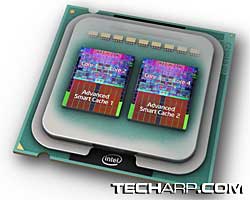Engineering Samples
 |
Everyone loves Intel ES (Engineering Sample) processors, don't they? They used to be very limited units used within Intel and sent to select (lucky) reviewers. For years, everyone has been chasing for these processors since they used to have their multipliers unlocked. Now, that's an overclocker's wet dream come true!
However, that distinction has blurred with the Intel Core 2 processor. Not only are Core 2 Duo or Core 2 Quad engineering samples far more plentiful, they are easily purchased by all and sundry.
Unlike the "traditional" engineering samples we all love though, their multipliers are not unlocked. This cuts down a little on their appeal. Only Core 2 Extreme engineering samples have unlocked multipliers. In other words, as far as multipliers are concerned, ES processors are similar to retail processors.
Still, they are engineering samples. Who wouldn't want them? They could have been handpicked for better overclockability. After all, Intel sends out ES units as review samples. Intel wouldn't send lousy processors to reviewers, would they?
Unfortunately, engineering samples aren't what you think they are. As far as the Core 2 engineering samples that are sold out there are concerned, they should really be considered defective goods, rather than special handpicked samples.
Cheap & Good?
The market has seen a remarkable influx of Core 2 engineering samples. They are sold like OEM processors, without any cooler, packaging or documentation. They are often available at a lower price than retail or OEM processors, but there are traders who sell them at a premium because of their mystique and purported "hand-picked" status. However there are some implications you should be aware of before you buy these units.
First of all, these ES processors are meant for internal use by Intel engineers and their partners. They are not meant for sale at all. They are generally used in Intel's quality control tests and remain Intel's property after the fact. Hence, those who sell these processors are actually selling stolen property. As a result, you could be in quite a bit of a fix if these processors do not work right, because :
a) ES processors are not covered by any warranty.
b) If you try sending one to Intel for RMA anyway, you will have the unenviable task of explaining to them how you procured a stolen processor.
Even if you are aware of the legal risks in purchasing such processors, you should also be aware that these ES processors have been subjected to incredible stresses during the tests. As such, many of these processors are inevitably damaged at the end of these tests. The damage may be relatively unnoticeable, as in minor logic units, or it can be so severe that the processor will not boot up on many motherboards, especially those using Intel 965 and 975 chipsets.
Update @ Dec. 7, 2008 - A confidential source just informed us that some unscrupulous dealers are flooding the market with ES samples from China. Many are now sold as OEM (tray) processors while others have been repackaged as fake retail processor kits or worse, used in PCs sold to unsuspecting users. More details to follow in the conclusion of this report.
Update @ Dec. 24, 2008 - According to another confidential source, the dealers are getting their Core 2 engineering samples from Shenzhen, China. A mixed batch of 300 Intel Core 2 ES processors was available for just RM 6000 (~USD 1714). That's an average cost of just RM 20 (USD 5.70) per processor! Even if most of the ES processors are of the slower E4000 series, that is still very much cheaper than what the actual OEM (tray) processors are going for. More details to follow in the conclusion of this report.
Support Tech ARP!
If you like our work, you can help support out work by visiting our sponsors, participate in the Tech ARP Forums, or even donate to our fund. Any help you can render is greatly appreciated!
|
|
Page |
Topic |
|
1 |
|||
2 |
• The
B0 Stepping |
||
3 |
• Other
Problems |
||
4 |
• Spotting
An ES Processor |
||
5 |







 Add to Reddit
Add to Reddit
